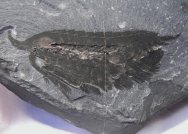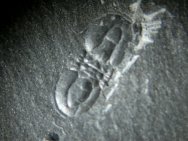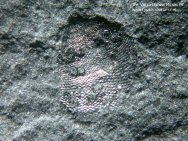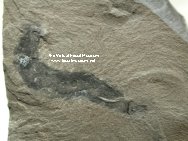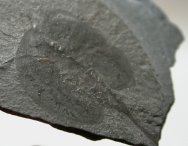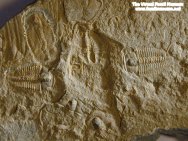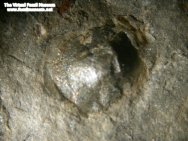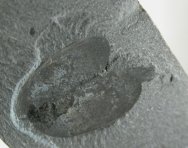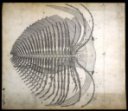 The
Burgess Shale is a very famous fossil Lagerstätte
named after the nearby Burgess Pass. This site is high in the
Canadian Rockies within Yoho National Park near the town of
Field, British Columbia, Canada. The Burgess Shale was discovered
in 1909 by famed paleontologist Charles Doolittle Walcott,
who
returned time and again to extensively study its fossils. Walcott
described a large diversity of previously unknown arthropods,
and most importantly many forms of previously unknown phyla
as well as many forms that remain enigmatic today. The fossils
were particularly important at the time to understand Cambrian
paleobiology because of their often
The
Burgess Shale is a very famous fossil Lagerstätte
named after the nearby Burgess Pass. This site is high in the
Canadian Rockies within Yoho National Park near the town of
Field, British Columbia, Canada. The Burgess Shale was discovered
in 1909 by famed paleontologist Charles Doolittle Walcott,
who
returned time and again to extensively study its fossils. Walcott
described a large diversity of previously unknown arthropods,
and most importantly many forms of previously unknown phyla
as well as many forms that remain enigmatic today. The fossils
were particularly important at the time to understand Cambrian
paleobiology because of their often 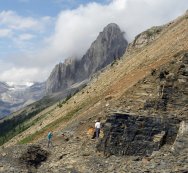 exquisite preservation
that included soft body parts. Many such Cambrian sites have
since been discovered,
most notably the Chengjiang Maotianshan
Shales, which are collectively called sites with Burgess
Shale-like preservation.
exquisite preservation
that included soft body parts. Many such Cambrian sites have
since been discovered,
most notably the Chengjiang Maotianshan
Shales, which are collectively called sites with Burgess
Shale-like preservation.
The
Burgess Shale fossils are about 505 million years old, some
20 million years younger than those from Chengjiang. In fact,
the Burgess Shale and Chengjiang have considerable overlap
in
faunal forms. Less well known is that Cambrian formations
in the House Range of Utah
yield many fossils like the Burgess Shale, though the soft
tissue
preservation is usually not as good. The Burgess Shale Formation
comprises 10 separate members, the most famous being the
Walcott Quarry Shale Member comprising the greater phyllopod
bed.
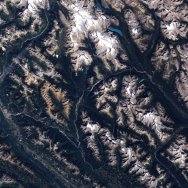 The
Burgess Shale comprises shale, limestone and siltstone and
extends in a large area in outcrops of the Stephen Formation
that
exhibite
different
faunal mixes.
The fossils of the Burgess Shale
are preserved as black carbon films
on black shales. Scientists long believed the deposits were
formed when areas of muddy ocean
floor
slid
into a
lower
place creating an anoxic (oxygen-starved) environment that
was particularly favorable to fossilization
because decay was inhibited. More recent research that oxygen
was continually present in the sediment
The
Burgess Shale comprises shale, limestone and siltstone and
extends in a large area in outcrops of the Stephen Formation
that
exhibite
different
faunal mixes.
The fossils of the Burgess Shale
are preserved as black carbon films
on black shales. Scientists long believed the deposits were
formed when areas of muddy ocean
floor
slid
into a
lower
place creating an anoxic (oxygen-starved) environment that
was particularly favorable to fossilization
because decay was inhibited. More recent research that oxygen
was continually present in the sediment
While
there are older Cambrian Lagerstatten, the Burgess Shale
was science's first glimpse of the Cambrian
Explosion in the fossil
record. The extensive diverse fauna generally new to science
and their often exquisite soft-bodied preservation, caused
Walcott him to return
repeatedly to the fossil site until 1924.
By
age 74 he had amassed more than
65,000 specimens. Describing the fossils was a vast task the
Walcott continued until his death in 1927. Walcott, influenced
by the opinion of scientific peers, tried to associate the
fossils with living taxa, which delayed the scientific significant
of them to be delayed by serveral decades. Three decades of
study commencing in the 1960's led to the Burgess Shale ultimately
attaining the recognition of today as a remarkable rock record
of early Cambrian life and its early diversification.
Burgess
Shale Fossils
|
| Partial
List of Burgess Shale Fauna
Phylum
Annelida
Canadia
Phylum Arthropoda
Burgessia
Canadaspis
Elrathina (trilobite)
Leanchoilia
Marella
Naraoia
Olenoides (trilobite)
Perspicaris
Ptychagnostus (trilobite)
Sidneyia
Waptia
Yohoia
Phylum Brachiopoda
Micromitra
Phylum Chordata
Pikaia
Phylum
Ctenophora
Ctenorhabdotus
Fasciculus
Xanioascus
|
Phylum
Hyolitha
Haplophrentis
Phylum Mollusca
Scenella
Phylum Onychophora
Aysheaia
Hallucigenia
Phylum Porifera
Choia
Phylum Priapulida
Ottoia
Phylum Incertae sedis
Amiskwia
Anomalocaris
Dinomischus
Nectocaris
Odontogriphus
Opabinia
Orthrozanclus
Wiwaxia |
|
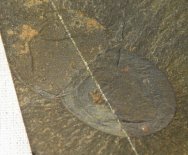 |
|
|
|
|
|
|
| |
Marella
splendens
Phylum Arthropoda
Order Marrellomorpha
Stephen Formation
Burgess Pass
|
|
Ottoia
prolifica
Phylum Priapulida
Family Ottoidae
Stephen Formation
Burgess Pass |
|
|
|
|
Burgessia
bella
Phylum Arthropoda
Family Bugessiidae
Stephen Formation
Burgess Pass |
|
Scenella
amii
Phylum Mollusca (?)
Family Scenellidae
Stephen Formation
Burgess Pass
|
|





